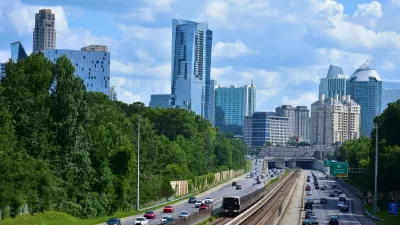Recent studies seem to indicate that public transportation is habit-forming, and, as Brad Plumer notes, that may not be a good thing.
Plumer points to two recent studies, one in New York and one in Philadelphia, that show the rise in transit use that accompany spikes in gas prices remain in place even as gas prices fall back down.
"This research is all discussed in a new policy brief
(pdf) by the American Public Transportation Association, which notes
that the United States appears to have entered a new era of oil
volatility. (They're not alone
in thinking so!) And that means that demand for public transportation
is likely to keep surging. If gas prices spike, more people will try to
ride the bus or train to work. If gas prices then settle down again,
many of those people will stick with transit."
The problem, pointed out by Plumer, is that America's transit agencies are ill equipped to handle increased demands. In fact, 71 percent of metropolitan transit agencies have had to cut services in the past year or are currently considering it.
Of course the catch-22 in this equation is the federal government's reliance on gasoline taxes for transit funding. "Transit is funded through a
dedicated fraction of the gas tax. And that can create havoc: Whenver [sic]
oil volatility pushes people away from driving and toward transit, that
means there's less gas-tax revenue available. We've seen this during the
current recession - driving has plunged, which means gas-tax
collections have fallen, which means Congress is bickering about whether to cut money for transit systems."
FULL STORY: Public transportation is habit-forming — and that’s a problem!

Alabama: Trump Terminates Settlements for Black Communities Harmed By Raw Sewage
Trump deemed the landmark civil rights agreement “illegal DEI and environmental justice policy.”

Planetizen Federal Action Tracker
A weekly monitor of how Trump’s orders and actions are impacting planners and planning in America.

The 120 Year Old Tiny Home Villages That Sheltered San Francisco’s Earthquake Refugees
More than a century ago, San Francisco mobilized to house thousands of residents displaced by the 1906 earthquake. Could their strategy offer a model for the present?

Ken Jennings Launches Transit Web Series
The Jeopardy champ wants you to ride public transit.

BLM To Rescind Public Lands Rule
The change will downgrade conservation, once again putting federal land at risk for mining and other extractive uses.

Indy Neighborhood Group Builds Temporary Multi-Use Path
Community members, aided in part by funding from the city, repurposed a vehicle lane to create a protected bike and pedestrian path for the summer season.
Urban Design for Planners 1: Software Tools
This six-course series explores essential urban design concepts using open source software and equips planners with the tools they need to participate fully in the urban design process.
Planning for Universal Design
Learn the tools for implementing Universal Design in planning regulations.
Clanton & Associates, Inc.
Jessamine County Fiscal Court
Institute for Housing and Urban Development Studies (IHS)
City of Grandview
Harvard GSD Executive Education
Toledo-Lucas County Plan Commissions
Salt Lake City
NYU Wagner Graduate School of Public Service





























